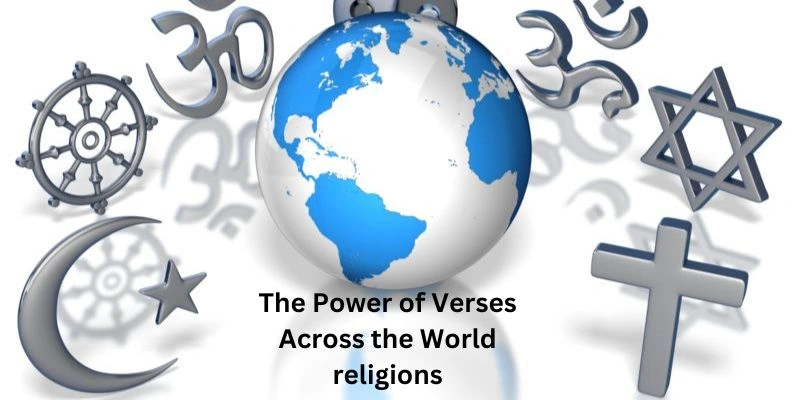Verses that Ignite: Unveiling the Power of Verses Across World Religions
Updated: March 4, 2024
114
“The Power of Verses Across World Religions” takes you on a fascinating journey exploring how poetry and sacred texts influence cultures and faiths around the world. We’ll give the universal language of verse, breaking down barriers to uncover the wisdom, inspiration, and spirituality shared among various religious traditions.
Come celebrate the diverse expressions of humanity, unity, and understanding woven through the timeless beauty of poetic verse across the globe. The “Power of Verses Across World Religions” refers to the impact specific lines or passages within religious texts have on believers and society. These verses can seen as powerful tools for various reasons.
1-Inspiration through the Power of Verses Across the World religions
Verses often contain words of wisdom, teachings, and stories that inspire individuals, and groups and guide them in their daily lives.

2-Comfort and hope with religious verses
Many verses offer relief and hope during difficult times, reminding individuals of their faith and offering strength to persevere.
3-Religious verses lay the foundation for Building communities
Shared verses can create a sense of common ground and identity within religious communities, connecting individuals through shared beliefs and values.
4-Power of verses, Shaping culture and laws
In some cases, powerful verses have impacted cultural practices or even legal codes, shaping the way societies function.
Verses on the Power of Prayer in Islam
Prayer (Salah) is a cornerstone of Islamic faith and practice. It is a direct line of communication between a believer and Allah. The Quran has numerous verses that illustrate the significance of prayer in a Muslim’s life. These verses of the Quran highlight how prayer offers strength, hope, and a sense of closeness to Allah.
Quran and Hadith on Prayer
“And when My servants ask you, [O Muhammad], about Me, say, ‘I am near. I respond to the الدعاء (du’aa – supplication) of the supplicant when he calls upon Me. So let them respond to Me [by obedience] and have faith in Me that they may be successful.'” Surah Al-Baqarah, Verse 186
This verse emphasizes the closeness of Allah to those who call upon Him and the importance of daily prayer in establishing a strong connection with the Divine.
“The Prophet (ﷺ) said, “None of you should belittle his supplication, for a man supplicated to Allah for ninety-nine years, and then he died. The people said, ‘If he had only supplicated more!’ So do not belittle your supplication.'” Sahih Muslim, Hadith 2735
This hadith encourages persistence in prayer, reminding us that the effects of supplication might not have an immediate impact but can be immensely.
Powerful verses from the Quran that showcase the importance of prayer
“And when My servants ask you, [O Muhammad], concerning Me – indeed I am near. I respond to one’s prayer when they call upon Me. So let them respond to Me [by obedience] and believe in Me, perhaps they will be [rightly] guided.”Surah Al-Baqarah (The Cow) 2:186
“Establish prayer, give regular charity, and bow down with those who bow down.”Surah Al-Baqarah (The Cow) 2:153
“So be patient, [O Muhammad], and your patience is not but for Allah. And listen attentively to those who turn to Allah [in repentance], and glorify the praise of your Lord before sunrise and before sunset.”Surah Taha (Ta-Ha) 20:14
This verse emphasizes prayer as a source of patience and strength, particularly during challenging times in life.
“Verily, prayer restrains [one] from indecent deeds and evil.”Surah Al-Mu’min (The Believer) 40:60
These are just a few examples of the many Quranic verses that speak about the power of prayer in Islam.

Importance and effectiveness of prayer in Christianity
Here is a breakdown of key Bible verses that emphasize the importance of prayer in Christianity
In Christianity, Prayer as a Direct Line to God
“Ask, and it will be given to you; seek, and you will find; knock, and it will be opened to you. For everyone who asks receives, the one who seeks finds, and to the one who knocks, the door will be opened.” (NIV)Matthew 7:7-8:
This verse highlights the accessibility of prayer. God encourages us to ask, seek, and knock, indicating our prayers are heard and responded to.
“Do not be anxious about anything, but in every situation, by prayer and petition, with thanksgiving, present your requests to God. And the peace of God, which transcends all understanding, will guard your hearts and your minds in Christ Jesus.” (NIV)Philippians 4:6-7:
This verse emphasizes prayer as a means of communication with God. We are encouraged to bring our worries and requests to Him, finding peace through the act of prayers itself.
Prayer for Guidance and Wisdom
“If any of you lacks wisdom, you should ask God, who gives generously to all without finding fault, and it will be given to you.” (NIV)James 1:5:
This verse assures us that God offers wisdom to those who seek it through performing prayer.
Keep prayer for Strength and Encouragement
“The Lord is my light and my salvation—whom shall I fear? The Lord is the stronghold of my life—of whom shall I be afraid?” (NIV)Psalm 27:1:
“Do not grieve, for the joy of the Lord is your strength.” (NIV)Nehemiah 8:10:
These are some examples, and the Bible also has many other powerful verses on prayer’s importance.
The Power of Verses in Buddhism
While some might compare Buddhist practices to prayer, the role they play is quite different. In Buddhism, the focus is not on petitioning a higher power, but on cultivating inner transformation through meditation.
Meditation as Mental Training
Meditation works as a mental training, akin to exercising a muscle, through focused attention and mindfulness, Buddhists aim to develop qualities like compassion, wisdom, and equality.
The Pali Canon and Mindfulness
The Pali Canon, considered the earliest collection of Buddhist teachings, emphasizes the importance of mindfulness. The “Anapanasati Sutta” (Mindfulness of Breathing Discourse) is a good example.
Buddhism uses meditation as a tool for self-transformation, not as a means to communicate with a deity.
The Concept of Prayer Across Cultures
1-Prayer is a Universal Language Beyond Churches and Mosques
Prayer. It is a word that often conjures images of stained glass windows and kneeling pews. But the truth is that prayer is a far more universal language, practiced in countless ways across cultures and traditions.
Common Threads Across Cultures
| Gratitude |
|---|
|
People everywhere express thankfulness for blessings, big and small. The Navajo people might offer a prayer of thanks for a successful hunt, while in China a Chinese family might light incense sticks in appreciation for good health. |
| Petition |
|---|
|
Seeking help and guidance is a powerful aspect of prayer. A brave man warrior might pray for strength and courage before a battle, just as someone facing a tough decision might offer a silent plea for wisdom. |
| Connection |
|---|
|
Prayer is a way to connect with something beyond ourselves – a great power, the spirit world, or even our inner selves. In most cultures, prayer is seen as a bridge between the seen and unseen realms. |
Scientific Perspectives on Prayer
1-Can Prayer Really Boost Your Health?
For centuries, people have turned to prayer for comfort, guidance, and strength. Recent research suggested the potential link between prayer and both mental and physical health.
2-Prayer’s Potential Benefits
- Stress Relief
- Inner Peace and Gratitude
- Improved Mental Health
Conclusion
While the scientific exploration of prayer’s effects is ongoing, with its restriction, verses offer a different kind of power. They provide timeless words of comfort and hope that have resonated with people across cultures and generations. Whether you find solace in specific verses, use prayer as a form of daily practice, or simply appreciate the beauty of these golden words, the power they hold lies in their ability to speak to your heart. Ultimately, the journey of faith and well-being is a deeply personal one, and verses can serve as a source of inspiration and guidance.
What is the significance of verses in world religions?
Verses hold great power in conveying the teachings and principles of various world religions. They serve as a sacred and profound way to connect individuals with their faith.
How do verses impact the lives of followers?
Verses can inspire, comfort, guide, and motivate followers daily. They provide a sense of grounding and clarity in times of uncertainty.
Can verses from different religions be interconnected?
Absolutely! The beauty of verses from different world religions is that they often share similar themes of love, compassion, and peace. Individuals can find common ground and deepen their understanding of spirituality by exploring different religious texts.
How can verses be used for personal growth and self-reflection?
Meditating on verses can help individuals gain insights into their beliefs and values. Verses are a source of introspection and self-improvement, helping individuals navigate life’s challenges and find inner peace.
Are there any universal verses that resonate with people from all religions?
Yes, some verses are universally uplifting and resonate with individuals from various religious backgrounds. These verses often emphasize love, kindness, and unity, serving as a unifying force among diverse communities.
Please Write Your Comments